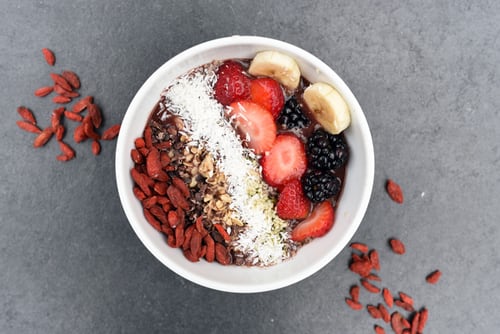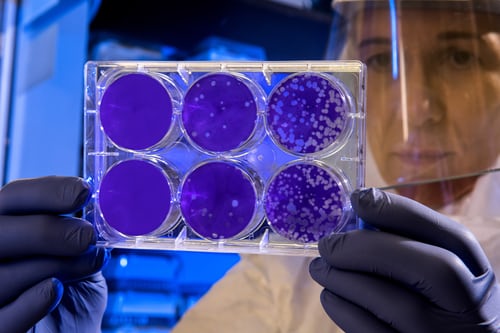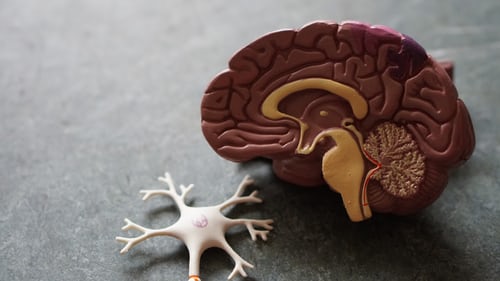Multiple sclerosis or MS currently affects about 2.5 million people worldwide with the number of people being diagnosed on the increase.
Given that genetic changes are unlikely to play a role in this rise (genes don’t change in a population that quickly) the role environmental factors including diet are playing needs to be addressed.
Which brings us to the topic of today’s post what are some of the things you can do dietarily speaking (plus a few others) to prevent MS or if you have already been diagnosed with MS protect and promote wellness?
First Up, What Is Multiple Sclerosis?

In technical terms multiple sclerosis or MS is a chronic demyelinating and neurodegenerative disease resulting from underlying autoimmune and inflammatory processes.
What this means in every day speak is that the fatty covering (myelin) surrounding the cells of your central nervous system (CNS) are essentially targeted for attack and destruction by your own immune system.
So What?

Due to the crucial role these fatty sheaths surrounding the cells of your CNS play in allowing for fast, smooth and accurate transmission of nerve impulses their destruction leads to a wide variety of problems from loss of hearing and sight to pain, fatigue, bowel and bladder dysfunction, impaired coordination and paralysis.
Some people may experience all or some of these symptoms on and off while other people may experience them chronically (all the time).
What Causes MS?

It is unclear exactly why this misguided immune response occurs.
However, there are a number of potential contributing factors which have been identified including genetic susceptibility, possible viral infection, the environment you live in including the air you breathe and the foods you eat, gut health including your microbiome and a huge array of psychosocial factors (trauma, stress, emotional repression, co-dependency, feeling things are out of your control, putting yourself last, the need to please, harsh self-judgement and criticism to name a few).
Women are at higher risk of MS then men and overall this condition occurs most commonly in those between 20-40 years old.
Can Nutrition Help MS?

Yes.
Just how diet affects MS and defining the optimal diet for MS is another story…
Up until recently nutrition wasn’t factored high into the care plan for people with MS and still often isn’t depending on the level of knowledge and experience of your neurologist or what alternative help you seek.
And while I may be a little biased here being a Dietitian and having studied the nuances of human nutrition its impact on health and pathology for over 4 years I think what you put into your body while granted it may not be the be all and end all of your experience of health has a higher potential to harm or heal then we often give it credit for.
In any case after a diagnosis of what is typically thought of as a “chronic” illness such as MS (that is it is seen as an illness with no chance of full recovery) I would honestly understand why someone would look for an answer and most likely give anything a go which is why I’d super encourage you to work with a health and nutrition professional (aka a Dietitian) as yes, diet can help but it can also harm.
A very real result of any unsound nutrition advice (even with the best of intentions) is too often macronutrient and micronutrient deficiencies both of which place you at higher risk of further complications.
Also, if you are considering taking supplements which contain exceedingly high doses of vitamins or minerals please know that this poses a risk for toxicity but can also have flow on effects because our bodies simply aren’t designed to absorb nutrients in this way. When we do the binding sites on transport proteins and enzymes are saturated and disrupt your uptake of other vitamins and minerals which also rely on those same binding sites to get into and be used by your body. This interference with your absorption of other vitamins and minerals can create deficiency elsewhere.
You may have heard of a number of the diets which have been both developed and trialled to help lessen symptoms as well as overcome underlying causes of MS. Including the Kousmine, Swank, Paleolithic, Mediterranean, McDougall. gluten-free, Longo diet, mimicking fasting and anti-inflammatory style eating. But which is best and which should you be following?
Which Diet Is Best?

Most likely none of them.
What do I mean by this? While the overall guiding principles of most of the above diets I’ve mentioned are similar – base your meals on whole, minimally processed foods with variations on this theme from vegetarian, high carb, low fat to carnivorous low carb, high fat (and everything in between) at the end of the day the perfect diet for you is the perfect diet for you and not a set of hard and fasts dos and don’ts.
I have worked with people with MS who’ve had stomach and digestive issues their whole lives and have gone onto the Swank diet for example and their gastrointestinal (GI) issues have worsened because they were gluten sensitive and the Swank diet is quite high in gluten containing carbs.
I’ve worked with people with MS who’ve been instructed by their GP to lose weight so have followed Weight Watchers programs only to regain all the weight immediately after going off it because they never developed the real life skills to choose healthy foods which felt right for their body or dealt with the underlying beliefs that the need to put everyone else’s needs first was more important and they never developed a healthy self-identity in line with what they could do and who they could be.
Moral of the story: before anything else consider working with a Dietitian and tailor make a diet that truly works for you on all levels. Even then it takes more than that to truly make health lifelong.
It takes getting to know yourself and it takes trusting yourself to meet your needs and I’ve found that most of us don’t achieve this in isolation because of the experiences we’ve had in life and the dominant messages we’re fed by society that our bodies are not to be trusted (wt actual f? our bodies are literally designed through years and years of evolutionary processes to tell us what we need and to drive us towards health).
Have you ever been told to “stress less”? then you’ll know it’s no mean feat alone and most of us need some actual guidance on “how to” do this not just “to” do it.
If It’s That Complicated Where Should I Even Start?…

Getting back on track with the diet stuff…
In terms of MS and diet the main link I see between MS symptoms and where food may play a role is inflammation.
The link between diet and symptoms of inflammatory diseases including MS has been increasingly brought to life over recent years and even without what would be considered a full evidence base behind it I think there is a lot of potential here.
As I said if you are going to be trying this and that anyway I’d more than encourage you to work with a Dietitian and address the areas that matter most rather than spend years going in circles or even potentially worsening your symptoms.
To get you thinking between now and your dietetics session some of the areas with evidence behind them (or at least the beginnings of evidence even if they’re not yet common practice because on average it takes 17years for evidence to be converted into use) which you may want to begin looking at are antioxidants, fats, carbohydrates and energy, vitamin D and the health of your gut bacteria.
Antioxidants

The white matter of your brain (aka the myelin sheaths wrapped around your nerve fibres that your immune system attacks during the course of MS) has a low concentration of antioxidant enzymatic activity which makes it highly susceptible to damage from reactive oxygen species2.
Fruits, vegetables and wholegrains contain a number of different antioxidants including vitamin E, C and A, oligoelements such as selenium and manganese as well as carotenoids, polyphenols, thiol compounds, alkylresorcinols and fibre that may be involved in protecting lipid metabolism (fat breakdown) in the white matter of your brain3. Which means that eating a good amount of fruits, vegetables wholegrains is a great place to start in getting in more antioxidants and potentially protecting the white matter of your brain.
Different types of fruits, vegetables and wholegrains contain different healthful compounds and at different concentrations so it’s about getting a good mix of different fruits, vegetables and wholegrains daily versus focusing on one magical fruit.
Fats

Have you heard the stat that your brain is over 60% fat? Most of that fat is found in the myelin sheaths covering your nerve fibres which we talked about right back in the beginning of this post and which are progressively destroyed in MS so it shouldn’t really come as a surprise that when it comes to MS fat is important.
But how does dietary fat affect MS and how can I best make use of this?
Overall there are recommendations to replace saturated fats with unsaturated fats (omega 3 and omega 6 polyunsaturated fats or PUFAs). With the greater focus being on omega 3s because they have known anti-inflammatory properties.
In the brains of normal, healthy humans the essential fatty acid DHA (docosahexaenoic acid) is found in high concentrations whereas in the brains of people with MS decreased levels of DHA have been found1. Evidence perhaps to consider upping your intake of this essentially fatty acid?…
Furthermore, both DHA and the other essential fatty acid EPA (eicosapentaenoic acid) have been shown to have anti-inflammatory, anti-thrombotic (preventing blood clots), and immune-modulatory activities to such a degree as is comparable with those of statin medications4,5.
The best sources of both DHA and EPA are seafood and fish-oil. Other sources include meat (from grass-fed animals), eggs, breast milk and sea vegetables (seaweed).
If you are vegetarian or vegan some strategies for maximising the conversion of other PUFAs (namely alpha linolenic acid or AHA) to the essential fatty acids DHA and EPA are to: add ground flaxseed, flaxseed oil, chia seeds, hempseeds, hempseed oil and walnuts to your meals and include olive oil or avocado oil, nuts and seeds daily.
As well as this ensure you are eating an adequate amount of a wide variety of foods so that you are meeting your needs for the different micronutrients (vitamins and minerals) as many different micronutrients are important in the conversion process of ALA to DHA and EPA. Including vitamins B3 (niacin found in for example avocado, peanuts and wholegrains), B6 (pyridoxine found in for example soybeans and wholegrains) and C (fresh fruits and vegetables), and the minerals zinc (pumpkin seeds) and magnesium (dark chocolate, tofu and legumes such as baked beans and chickpeas).
Energy, Carbs and Protein (The Macronutrients)

We’ve already covered one of the macronutrients (fat) separately so here I’ll briefly discuss carbs and protein and their role in MS.
Carbohydrate
Carbohydrate is broken down in our digestive tract into glucose which is both our brains and our red blood cells preferred source of fuel.
Furthermore, glucose the main source of energy for literally all body functions from muscle contraction to talking and is also required for the processing of other nutrients.
According to the Acceptable Macronutrient Distribution Range (AMDR) Guidelines carbs should be making up around 45-65% of your daily energy intake and predominantly this should be coming from wholegrain and unrefined sources (fruits, vegetables, milk and yoghurt and wholegrain cereals) as these are again the sources highest in the micronutrients.
Importantly a low intake of carbs can cause fatigue, low energy and enjoyment. All of which are common symptoms people with MS experience.
Therefore, despite carbs bearing the brunt of recent diet culture with some of the most popular diets today hugely limiting or attempting to remove them all together in the name of “health” they undeniably have a place. A very important place at that and if you are experiencing symptoms of fatigue or irritability and limiting your carb intake this may be a good time to revaluate.
Protein and Energy
Currently there is insufficient evidence to give precise energy and protein requirements for those with MS.
However what I would like to share with you is the results of one study in which 197 newly diagnosed MS cases were matched with 202 control cases (normal, healthy people without MS) for age and gender and it was found that the cases (those with new MS diagnoses) had significantly lower body mass indexes (BMI) than the controls6.
These findings could be taken to mean either that people with lower BMI are at higher risk of developing MS or that the disease creates a hypermetabolic state (increased metabolic rate and consequently weight loss for those not eating enough to meet this increased need).
Either way it is likely that if you have MS your energy and protein requirements will be altered which is why I encourage you to seek assistance from a Dietitian to create a plan suitable to you rather than attempt to go off generic protein and energy intake recommendations.
Vitamin D

For quite a while the link between vitamin D status and MS has been investigated and while how exactly vitamin D plays a role is unknown it is largely recognised that vitamin D is important in both the prevention and also the management of symptoms and disease progression7-9.
Vitamin D is also crucial to maintaining bone health and impaired physical activity with progressive MS can place you at greater risk of osteoporosis10,11.
It has been found that people with MS have a lower response than people without MS to vitamin D supplementation12 this may mean to get the same beneficial effects of vitamin D you may need higher levels than those without MS.
Most of our vitamin D comes from the conversion of the vitamins precursors in our skin when exposed to sunlight (and further modification and activation in our kidneys) but if you are interested in also upping food sources of vitamin D or live in an area where you don’t get a lot of exposure to sunlight some good food sources of vitamin D include oily fish and fish oil capsules, beef liver, egg yolk and cheese.
Gut Microbiome

What you eat is more than the calories (energy) and more than the micronutrients the foods contain.
What you eat also affects the bacterial composition of your digestive tract.
In recent years the bacterial composition (known as the microbiome) of our digestive tracts and the role it plays in health and disease including mental health has really entered the spotlight.
It is now known that the types of bugs in our digestive systems have not only a strong influence on our digestive capability and food absorption1, but also on hormone production and inflammatory processes, as well as the health of our brains13-15.
It appears that having a diverse and healthy microbiome is something we likely need to take into consideration when aiming to create healing for those with MS.
Ps. The Absolute Certain Steps You Can Do That Are Evidence Based and Will Help

If you smoke, get help to quit.
If you drink a lot get help to reduce or your intake or to stop entirely.
Include regular exercise. This doesn’t have to be a daily marathon or gym workouts either just a gentle daily stroll is enough. The beneficial effects of exercise for the general population as well as for people with MS are numerous and well known and here I’m just going to mention one its apparent ability to enhance neuroplasticity (the ability of your brain to change, adapt and recover throughout your life). Which if you have MS (or not) is by any definition pretty important.
Decrease your stress. This can include the classical things commonly thought of when thinking about addressing stress like meditation or yoga but also if you are highly stressed consider getting help to build the skills and resources necessary to reduce your stress levels sustainably so that you no longer require those specified times out for stress as your brain naturally does this.
Summary and Take Home Points on Eating for MS

While changing what you eat may not cure your MS in conjunction with medical treatment nutritional therapy (aka dietary changes) can help prevent or slow further deterioration, optimise symptom management, create wellness and health and improve your overall quality, enjoyment and engagement in your life.
As you can see it’s definitely not changing one area of diet or taking some particular supplement that will fix everything.
As with all things related to health it’s a mix of all the right things in amounts right for you which will allow you to experience your best health outcomes.
In this post I’ve shared with you a few of the key food components that I’ve been able to find in the literature on MS and diet (PUFAs, carbs, energy, looking at the health of your microbiome and vitamin D specifically) but they are just some of the areas of diet I focus on when I am working with someone with MS to optimise health and quality of life and a full description and run down of all food areas (let alone the clinical hypnotherapy and mind training side of it!) is beyond the scope of this blog post.
Which is why I would encourage you to ask yourself if you are willing to invest some of your time and money into truly getting the best information and support you can and make a time to see a Dietitian?
What if in 1 year you looked back and knew that was the best thing you ever did for your MS?
As a final note it is important also to remember that nutritional intervention is not a short term, fast acting drug. It may take months until you actually experience the beneficial effects of nutrition therapy but those effects are sustained.
With My Whole Heart I Hope You Found This Information Useful and Inspiring.

Become Great. Live Great.
Bonnie.
Reference
- Paolo Riccio, Rocco Rossano. Nutrition Facts in Multiple Sclerosis. ASN Neuro. February 18, 2015. 1-20.
- Pekmezovic TD, Tepavcevic DBK, Mesaros ST, Basuroski IBD, Stojsavljevic NS, Drulovic JS. Food and dietary patterns and multiple sclerosis: a case-control study in Belgrade (Serbia). Ital J Public Health. 2009;6:81-7.
- D’Avanzo B, La Vecchia C, Katsouyanni K, Negri E, Trichopoulos D. An assessment, and reproducibility of food frequency data provided by hospital controls. Eur J Cancer Prev. 1997;6:288-93.
- Calder, P. C. (2006) n-3 polyunsaturated fatty acids, inflammation, and inflammatory diseases. American Journal of Clinical Nutrition 83: 1505S–1519S.
- Farooqui, A. A., Horrocks, L. A., Farooqui, T. (2007) Modulation of inflammation in brain: A matter of fat. Journal of Neurochemistry 101: 577–599.
- Ghadirian P, Jain M, Ducic B, Shatenstein B, Morisset R. Nutritional factors in the aetiology of multiple sclerosis: a case-control study in Montreal, Canada. International Journal of Epidemiology 1998; 27: 845-852.
- Munger KL, Levin LI, Hollis BW, Howard NS, Ascherio A. Serum 25- hydroxyvitamin D levels and risk of multiple sclerosis. JAMA. 2006;296:2832–8.
- Løken-Amsrud KI, Holmøy T, Bakke SJ, Beiske AG, Bjerve KS, Bjørnarå BT, et al. Vitamin D and disease activity in multiple sclerosis before and during interferon beta treatment. Neurology. 2012;79:267–73.
- Simpson Jr S, Taylor B, Blizzard L, Ponsonby AL, Pittas F, Tremlett H, et al. Higher 25-hydroxyvitamin D is associated with lower relapse risk in multiple sclerosis. Ann Neurol. 2010;68:193–203
- Huang Z, Qi Y, Du S, Chen G, Yan W. Bone mineral density levels in adults with multiple sclerosis: A meta-analysis. Int J Neurosci. 2015;125:904–12.
- Gupta S, Ahsan I, Mahfooz N, Abdelhamid N, Ramanathan M, WeinstockGuttman B. Osteoporosis and multiple sclerosis: risk factors, pathophysiology, and therapeutic interventions. CNS Drugs. 2014;28:731–42.
- Bhargava P, Steele SU, Waubant E, Revirajan NR, Marcus J, Dembele M, et al. Multiple sclerosis patients have a diminished serologic response to vitamin D supplementation compared to healthy controls. Mult Scler. 2016;22:753–60.
- Wang Y, Kasper LH. The role of microbiome in central nervous system disorders. Brain Behav Immun 2014; 38:1-12.
- Rea K, Dinan TG, Cryan JF. The microbiome: a key regulator of stress and neuroinflammation. Neurobiol Stress 2016; 4:23-33.
- Fleck AK, Schuppan D, Wiendl H, Klotz L. Gut-CNS-axis as possibility to modulate inflammatory disease activityimplications for multiple sclerosis. Int J Mol Sci 2017; 18: E1526.




8 thoughts on “Can Nutrition Help Multiple Sclerosis? A Dietitian’s Top 5 Tips to Reduce Symptoms”
very nice publish, i actually love this web site, keep on it!
Thank you very much for this your nice comment I appreciate the feedback and am happy to know you find my site useful. If you ever have a topic you’d like more info on please feel free to email and let me know and I’ll put a blog out on it.
Very interesting topic , appreciate it for putting up.
Thank you I’m happy to hear you appreciate it and for certain it’s an important area.
very nice put up, i actually love this website, carry on it
Thank you for your kind words. It’s always wonderful to hear when people love my site and the info I share so I appreciate it. Thanks.
I want to to thank you for this wonderful read!! I definitely enjoyed every little bit of it. I have you saved as a favorite to check out new things you post…
Thank you for letting me know you enjoyed every little bit of it! I hope you find many more of my posts valuable also. Please feel welcome to comment or email me any topics you would like to read more on in particular.
Enjoy your day,
Bonnie.